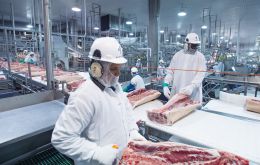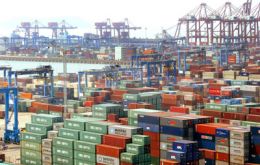MercoPress. South Atlantic News Agency
Tag: Chinese imports
-
Friday, November 22nd 2019 - 09:46 UTC
China buying all Brazilian beef available; meat prices in Sao Paulo at record high

Chinese demand is increasingly swallowing up Brazil's beef supply, pushing the country's cattle prices to a record high. China’s hunger for foreign meat has shot up as an outbreak of African swine fever has reduced its domestic pig population and has sent it looking for substitutes.
-
Friday, August 2nd 2019 - 09:46 UTC
US business lobbies warn extra tariffs will hurt American consumers

President Donald Trump's threat to impose 10% tariffs on the remaining US$300 billion of Chinese imports from Sept. 1 will hurt consumer purchases, raise prices further and limit hiring, four large retail trade groups warned on Thursday.
-
Wednesday, May 8th 2019 - 09:08 UTC
Asian markets plummet on concern over China/US trade deal; Beijing negotiator expected in Washington

A red wave swept across Asia trading floors on Wednesday as investors grow increasingly concerned that the China-US trade deal, which appeared all by ready to sign, could fall through.
-
Saturday, February 16th 2019 - 11:30 UTC
China/US trade talks break down; Washington warns “very difficult issues” remain unresolved

Trade talks between the US and China have broken up without a deal, with the US warning that “very difficult issues” remain unresolved. The talks in China this week were aimed at securing a new deal before further US tariffs are imposed on 1 March. China said negotiations would now continue in the US next week.
-
Friday, September 14th 2018 - 08:37 UTC
BoE and European central bank keep rates unchanged; Turkey hikes 625 points to 24%

Stocks in Europe reversed earlier gains by Thursday's close to finish lower, as investors digested fresh news out of the central banking sphere. The pan-European STOXX 600 closed down 0.15%, with the majority of sectors falling into negative territory. The U.K.'s FTSE 100 slipped 0.43% by the close, while France's CAC 40 ended a touch lower, off 0.08%, and Germany's DAX rose 0.19%.
-
Monday, July 11th 2011 - 07:51 UTC
China’s trade surplus soars in June with imports growth slowing down

China's trade surplus widened more than expected to 22.3 billion US dollars in June, the highest level in seven months, as imports grew at the slowest pace since 2009. The surplus was 13.1 billion USD the previous month and 20 billion USD a year earlier.
-
Friday, December 10th 2010 - 18:40 UTC
China posts record foreign trade in November, but fears of a “rough” 2011

Even when China's foreign trade hit a historic high in November, boosted by rising demand ahead of the Christmas shopping season, economists forecast a bumpy road next year.
